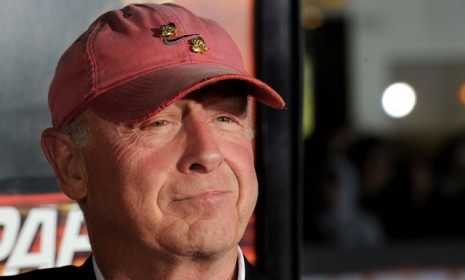4 reasons to remember Top Gun director Tony Scott
The Hollywood visionary — who committed suicide this weekend — will be remembered for his thrilling, unapologetic films

A free daily email with the biggest news stories of the day – and the best features from TheWeek.com
You are now subscribed
Your newsletter sign-up was successful
At 12:30 p.m. on Sunday afternoon, Tony Scott parked his Prius along the the Vincent St. Thomas Bridge in Los Angeles. According to eyewitnesses, the 68-year-old proceeded to scale 8- to 10-feet of fencing and, "without hesitation," jump to his death. The British-born director and producer was responsible for some of the most memorable films of the past 30 years, including 1986's smash, Top Gun, Beverly Hills Cop II, Days of Thunder, and many more. While it's unclear why he committed suicide, new reports suggest that he suffered from an inoperable form of brain cancer, and officials found notes to his loved ones in his car, as well as a suicide note in his office. "The death of Tony Scott is shocking and saddening," said film critic Roger Ebert on Twitter. "He was an inspired craftsman." Here, four of the most moving tributes:
1. Though overshadowed by his brother, he shone in his own right
Tony's work was always overshadowed by the more "intellectually provocative" films of his brother Ridley Scott (Aliens, Gladiator), says Jen Chaney at The Washington Post. But his work had a compelling "slickness," "a glossiness that appealed to our post-dawn-of-MTV sensibilities," particularly in his signature film, Top Gun. Sure, it was "cliché in the most fist-pumping, patriotic of ways," but I'd argue that Top Gun was the perfect film for its time. Despite being a Brit, Tony Scott understood that movie-goers were ready for something unabashedly American, and he tapped into the zeitgeist "so effectively" that a film about fighter jets became the year's No. 1 movie.
The Week
Escape your echo chamber. Get the facts behind the news, plus analysis from multiple perspectives.

Sign up for The Week's Free Newsletters
From our morning news briefing to a weekly Good News Newsletter, get the best of The Week delivered directly to your inbox.
From our morning news briefing to a weekly Good News Newsletter, get the best of The Week delivered directly to your inbox.
2. He was a thrill-seeker
"Scott was a thrill-seeker himself in his personal life," says the Associated Press, an avid rock climber who also enjoyed the rush of fast cars and motorcycles. And he considered high-stakes filmmaking life's foremost adventure. "The biggest edge I live on is directing," Scott said in a 1995 interview for Crimson Tide. "That's the most scary, dangerous thing you can do with your life… It's the fear of failing, the loss of face, and a sense of guilt that everybody puts their faith in you... [the risk of] not coming through."
3. He defined '80s rock 'n' roll filmmaking
When it came to movie-making, the younger Scott left "doubt and navel-gazing to the art house crowd," says Xan Brooks at Britain's Guardian, channeling a "very '80s breed of rock 'n' roll." With his fondness for blaring soundtracks, his films were "supple, glossy, and smart," truly "a reaction to the self-conscious noodling of '70s prog-rock." By the end of the 20th century, he was considered "the poster boy for populist Hollywood film-making, the master craftsman of the studio system, flogging high-concept thrills with a dizzying panache."
A free daily email with the biggest news stories of the day – and the best features from TheWeek.com
4. For all his bombast, he was an artist at heart
Scott considered himself a painter first, says Chris Jones at Esquire. "He drew his own storyboards. His movies looked a particular way, and lots of directors made their movies" look like his. And "there was often some small beautiful idea, about love or resilience or morality [at the core of his films]. There was always a heart at the center of the explosion." He was as funny and curious as he was profane, and he loved what he did without apology. "I've had a love affair with every movie I've ever done," he told me once. "Some of them have been a disaster, but in the main, I've had a great time f**king them...."
-
 How the FCC’s ‘equal time’ rule works
How the FCC’s ‘equal time’ rule worksIn the Spotlight The law is at the heart of the Colbert-CBS conflict
-
 What is the endgame in the DHS shutdown?
What is the endgame in the DHS shutdown?Today’s Big Question Democrats want to rein in ICE’s immigration crackdown
-
 ‘Poor time management isn’t just an inconvenience’
‘Poor time management isn’t just an inconvenience’Instant Opinion Opinion, comment and editorials of the day